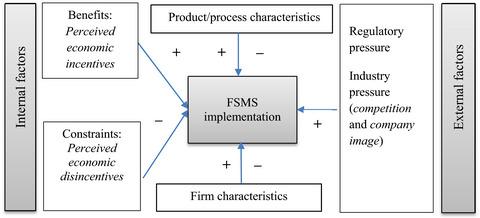当前位置:
X-MOL 学术
›
Food Sci. Nutr.
›
论文详情
Our official English website, www.x-mol.net, welcomes your feedback! (Note: you will need to create a separate account there.)
Drivers for the implementation of market‐based food safety management systems: Evidence from Lebanon
Food Science & Nutrition ( IF 3.9 ) Pub Date : 2020-01-17 , DOI: 10.1002/fsn3.1394 Gumataw Kifle Abebe 1 , Rachel Anne Bahn 1 , Ali Chalak 1 , Abed Al Kareem Yehya 1
Food Science & Nutrition ( IF 3.9 ) Pub Date : 2020-01-17 , DOI: 10.1002/fsn3.1394 Gumataw Kifle Abebe 1 , Rachel Anne Bahn 1 , Ali Chalak 1 , Abed Al Kareem Yehya 1
Affiliation

|
The food safety landscape continues to evolve across time, geography, and supply chains. This research seeks to analyze the determinants of market‐based food safety management systems (FSMSs) implementation in the Middle Eastern context. Primary data were collected from food safety managers representing 94 processors across Lebanon. We found food processors having implemented ISO 22000 (50%), HACCP (40%), and ISO 9001 (25.5%); however, none of the processors implemented industry‐based FSMSs. Although ISO 22000 was mostly implemented by large (85%) and medium (67%) processors, the uptake of ISO 22000 by small processors has picked up (29%). Economic incentives (market orientation) and firm‐specific factors (organizational readiness, product/process characteristics, company size, and ownership structure) are the key drivers for the increased implementation of market‐based FSMSs. Predominantly export‐oriented processors had the odds of implementing ISO 22000 5.5 times more than the domestically oriented processors. Firms with a quality assurance (QA) unit had 15 times higher chance of implementing ISO 22000 than otherwise. Finally, processors engaged in fresh produce had 4.9 times higher chance of implementing ISO 22000 than those engaged in dry goods. The study establishes that the dominance of public‐based FSMSs in the governance of food safety is a strategic choice (economic incentives) more than statutory requirements.
中文翻译:

实施基于市场的食品安全管理体系的驱动力:来自黎巴嫩的证据
食品安全形势随着时间,地理和供应链的变化而不断发展。本研究旨在分析在中东背景下实施基于市场的食品安全管理系统(FSMS)的决定因素。从代表黎巴嫩各地94家加工商的食品安全经理那里收集了主要数据。我们发现食品加工商已实施ISO 22000(50%),HACCP(40%)和ISO 9001(25.5%);但是,没有一个处理器实施基于行业的FSMS。尽管ISO 22000主要由大型(85%)和中型(67%)处理器实施,但小型处理器对ISO 22000的采用有所增加(29%)。经济激励措施(市场导向)和公司特定因素(组织准备情况,产品/流程特征,公司规模,和所有权结构)是增加实施基于市场的FSMS的关键驱动力。出口导向型处理器实施ISO 22000的几率是国产导向器的5.5倍。拥有质量保证(QA)部门的公司实施ISO 22000的机会是其他方式的15倍。最后,从事新鲜农产品的加工商实施ISO 22000的机会比从事干燥产品的加工商高4.9倍。该研究表明,基于公众的FSMS在食品安全治理中的主导地位是一项战略选择(经济诱因),而不是法定要求。拥有质量保证(QA)部门的公司实施ISO 22000的机会是其他方式的15倍。最后,从事新鲜农产品的加工商实施ISO 22000的机会比从事干燥产品的加工商高4.9倍。该研究表明,基于公众的FSMS在食品安全治理中的主导地位是一项战略选择(经济诱因),而不是法定要求。拥有质量保证(QA)部门的公司实施ISO 22000的机会比其他方式高15倍。最后,从事新鲜农产品的加工商实施ISO 22000的机会比从事干燥产品的加工商高4.9倍。该研究表明,基于公众的FSMS在食品安全治理中的主导地位是一项战略选择(经济激励措施),而不是法定要求。
更新日期:2020-01-17
中文翻译:

实施基于市场的食品安全管理体系的驱动力:来自黎巴嫩的证据
食品安全形势随着时间,地理和供应链的变化而不断发展。本研究旨在分析在中东背景下实施基于市场的食品安全管理系统(FSMS)的决定因素。从代表黎巴嫩各地94家加工商的食品安全经理那里收集了主要数据。我们发现食品加工商已实施ISO 22000(50%),HACCP(40%)和ISO 9001(25.5%);但是,没有一个处理器实施基于行业的FSMS。尽管ISO 22000主要由大型(85%)和中型(67%)处理器实施,但小型处理器对ISO 22000的采用有所增加(29%)。经济激励措施(市场导向)和公司特定因素(组织准备情况,产品/流程特征,公司规模,和所有权结构)是增加实施基于市场的FSMS的关键驱动力。出口导向型处理器实施ISO 22000的几率是国产导向器的5.5倍。拥有质量保证(QA)部门的公司实施ISO 22000的机会是其他方式的15倍。最后,从事新鲜农产品的加工商实施ISO 22000的机会比从事干燥产品的加工商高4.9倍。该研究表明,基于公众的FSMS在食品安全治理中的主导地位是一项战略选择(经济诱因),而不是法定要求。拥有质量保证(QA)部门的公司实施ISO 22000的机会是其他方式的15倍。最后,从事新鲜农产品的加工商实施ISO 22000的机会比从事干燥产品的加工商高4.9倍。该研究表明,基于公众的FSMS在食品安全治理中的主导地位是一项战略选择(经济诱因),而不是法定要求。拥有质量保证(QA)部门的公司实施ISO 22000的机会比其他方式高15倍。最后,从事新鲜农产品的加工商实施ISO 22000的机会比从事干燥产品的加工商高4.9倍。该研究表明,基于公众的FSMS在食品安全治理中的主导地位是一项战略选择(经济激励措施),而不是法定要求。



























 京公网安备 11010802027423号
京公网安备 11010802027423号